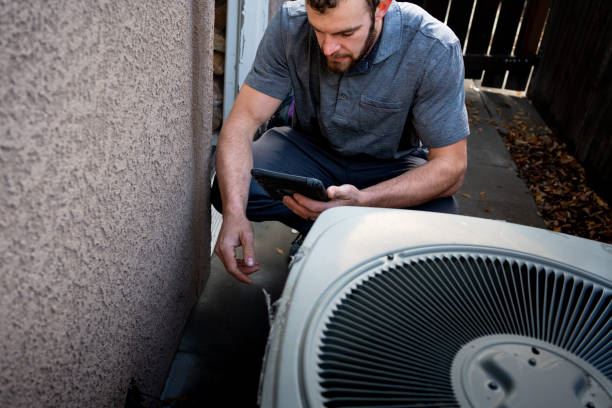
Understanding HVAC Error Codes
Decoding Error Messages
When your HVAC system starts flashing a cryptic error code, it can feel like trying to decipher an ancient language. But fear not, because these codes are your system's way of sending out an SOS. Each sequence of blinks, beeps, or digital displays corresponds to a specific issue, from a minor filter clog to a critical system failure. By consulting your HVAC manual or a quick online search, you can translate these signals into actionable information. It's important to note that while some error codes represent quick fixes that you can handle yourself, others are red flags that call for immediate professional attention.
Manufacturer-Specific Codes
Just as every car has its own set of dashboard warning lights, HVAC systems vary in their language of distress. A Lennox furnace might communicate differently than a Trane unit, for example. This is why understanding the nuances between brands is crucial. Manufacturer-specific codes are designed to pinpoint problems with precision, which can save you time and money on repairs. It's wise to familiarize yourself with the error codes for your particular model, as this knowledge can expedite the diagnostic process when you're discussing issues with a technician or attempting a DIY fix.
Thermostat Malfunctions
Troubleshooting Thermostat Issues
Thermostats are the unsung heroes of HVAC systems, quietly keeping our homes at just the right temperature. But when they go on the fritz, it can throw your entire system out of whack. Common issues range from dead batteries and misaligned components to incorrect settings that can be easily overlooked. Before you assume the worst, run through a checklist: replace batteries, ensure it's level and clean, and confirm that settings are appropriate for the season. Sometimes, the simplest solutions can restore harmony to your home's climate control.
Smart Thermostat Complications
Smart thermostats promise convenience and energy savings, but they're not immune to hiccups. Connectivity issues can arise from Wi-Fi interruptions or software glitches, leaving you unable to adjust settings remotely. Additionally, programming errors can occur if the thermostat isn't properly configured to your HVAC system's specifications. If you're facing such high-tech troubles, a reset might be in order, or you may need to review the user manual to ensure your smart device is speaking the same language as your heating and cooling units.
Airflow Obstructions and Inefficiencies
Identifying and Clearing Blockages
It's a breath of fresh air when your HVAC system operates smoothly, but airflow obstructions can quickly turn that breeze into a wheeze. Vents and ducts can become clogged with dust, pet hair, or even the occasional toy from a curious child. Regular inspections of your vents and registers can reveal these hidden blockages. Once identified, a thorough cleaning can often restore your system's breathability. Remember, clear ducts not only improve airflow but also enhance the overall efficiency and longevity of your system.
Enhancing Air Circulation
Improving your home's airflow isn't just about removing blockages; it's also about optimizing the path that air takes through your living space. This can involve rearranging furniture to ensure vents are unobstructed, using ceiling fans to assist in air distribution, or even adjusting the dampers within your ductwork to balance the system. By taking these steps, you can help your HVAC system deliver comfort more effectively, which can lead to energy savings and a more evenly heated or cooled home.
Refrigerant Leaks and Charging
Detecting Refrigerant Leaks
Refrigerant is the lifeblood of your HVAC system, and a leak can lead to a host of problems, from reduced efficiency to complete system failure. Signs of a refrigerant leak include ice on the evaporator coils, hissing noises, or a noticeable decrease in cooling power. If you suspect a leak, it's important to call in a professional. Handling refrigerants requires specialized training and equipment, and it's not a DIY job. A certified technician can safely locate and repair leaks, ensuring your system operates safely and effectively.
The Process of Recharging Refrigerant
Recharging your HVAC system's refrigerant isn't as simple as topping off the tank. It's a delicate process that involves precise measurements and an understanding of your system's requirements. Overcharging can be just as detrimental as undercharging, leading to inefficient operation and potential damage. This is why recharging should always be left to the professionals. They have the tools and expertise to ensure the correct amount of refrigerant is used, which is essential for your system's performance and the environment.
Electrical Component Failures
Diagnosing Electrical Issues
Electrical problems in your HVAC system can be both perplexing and difficult. Symptoms like a non-responsive thermostat, intermittent power, or a system that refuses to start are all red flags that something's amiss in the electrical department. Common culprits include blown fuses, tripped breakers, or worn-out capacitors. While resetting a breaker or replacing a fuse might be within your wheelhouse, tackling more complex electrical issues without proper training can be dangerous. It's best to consult with a seasoned HVAC electrician when in doubt.
Preventive Electrical Maintenance
Prevention is better than cure, especially regarding the electrical components of your HVAC system. Regular maintenance can help catch issues like loose connections or aging wires before they lead to bigger problems. Simple actions, such as ensuring your system is on a dedicated circuit and scheduling annual inspections, can extend the life of your HVAC unit. By being proactive, you can avoid the inconvenience of unexpected breakdowns and the expense of emergency repairs, keeping your system humming along year-round.
Great Lakes Heating & Air Conditioning
Are you a homeowner in the Great Lakes region grappling with HVAC headaches? Great Lakes Heating And Air Conditioning is your local expert, ready to diagnose and resolve any issue. From understanding error codes to recharging refrigerant, our team of certified technicians has the skills to bring comfort back to your home. Don't let HVAC hiccups disrupt your day—contact us for top-notch service and peace of mind. Your ideal indoor climate is just a phone call away!

